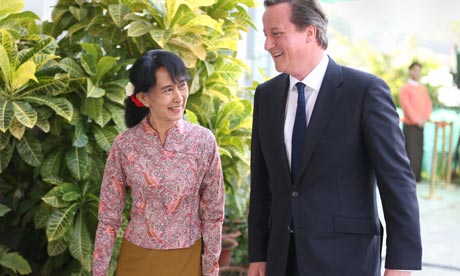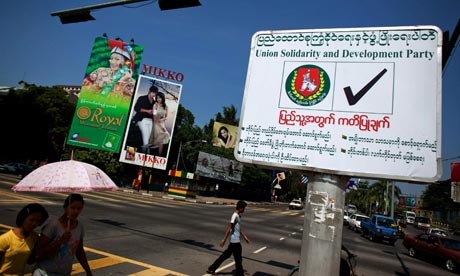Burma hails a new dawn, but sanctions still have a role to play | Wai Hnin Pwint Thon

Unless the EU sets benchmarks for real and irreversible change, the Burmese government will assume it's business as usual
For many decades, Burma seemed to be stuck in an endless cycle of suffering. Every 10 years or so there would be an uprising, which would then be brutally crushed. My own father was involved in those uprisings, and was jailed for his role in them. It seems like this cycle has been broken at last. My father and hundreds of other political prisoners have been released. Byelections have seen Aung San Suu Kyi win a seat in parliament at last.
The pace of change has been fast, but the international response faster. David Cameron has now secured the agreement of Aung San Suu Kyi that, except for the arms embargo, EU sanctions against Burma should be suspended. This is a significant shift in strategy, and a potentially risky one. In the past the policy has always been to relax sanctions in return for positive steps taken. Now the policy has been reversed, suspending sanctions before change, in the hope it will encourage further reform.
While the public talk is positive, it may be that Aung San Suu Kyi and the British government are concerned that the pace of change may falter, and are taking a gamble to try to keep momentum going. Not one of the benchmarks set by the UK and EU for the lifting of sanctions have been met. The unconditional release of all political prisoners has not happened. Hundreds of political prisoners remain in jail, and most of the prisoners who were released were not released unconditionally. Conflict has not ended. Attacks against ethnic minority civilians by the Burmese army have continued, resulting in horrific human rights abuses. And the byelections were not free and fair, even though the National League for Democracy did win almost all the seats they competed in.
There is no doubt that the military-backed government wants sanctions lifted. This is a big reason why changes have been taking place. There is now no way president Thein Sein can continue to complain that he has been making changes that haven't been rewarded by the international community. The next step is up to him. The danger, though, is that now they have got what they want, they could slow or even halt the pace of reform.
Unless the EU sets a clear timeline for reform, the Burmese government will assume the suspension will become permanent. Therefore, the EU should set benchmarks for real and irreversible change. They have called for the unconditional release of all political prisoners, but should also demand the repeal of the repressive laws that put them there in the first place. As my father says, any time the government wants, it can send him back to jail. I'm still very scared this could happen.
The EU has called for an end to ethnic conflict, but ceasefires without a political solution to the root causes of the conflict won't bring lasting peace. The EU must ensure there is a real dialogue with ethnic representatives, which will lead to constitutional change.
The EU called for free and fair elections, but these are impossible because of electoral, censorship and security laws in Burma. These need to be repealed for free elections to be possible.
And finally, there must be an inclusive dialogue process which leads to legal and constitutional change. So far all changes have been top-down decisions by the president, with some communication with Aung San Suu Kyi. Other political groupings have not been included in any genuine dialogue process, nor have ethnic representatives. Burma's current constitution gives the military control over every level of government. Until this is changed, reforms won't be irreversible.
The EU used to review sanctions on Burma every six months rather than annually, and should now return to this timeframe. If benchmarks are not met, there should be no delay in starting to re-impose sanctions.
There have been changes in Burma, and these must be recognised and rewarded, but no political prisoner should be left behind in appalling conditions in jail. No mother should fear soldiers shooting her children, or being raped by them. These things are still going on in Burma, and until they end, sanctions still have a role to play.



















































